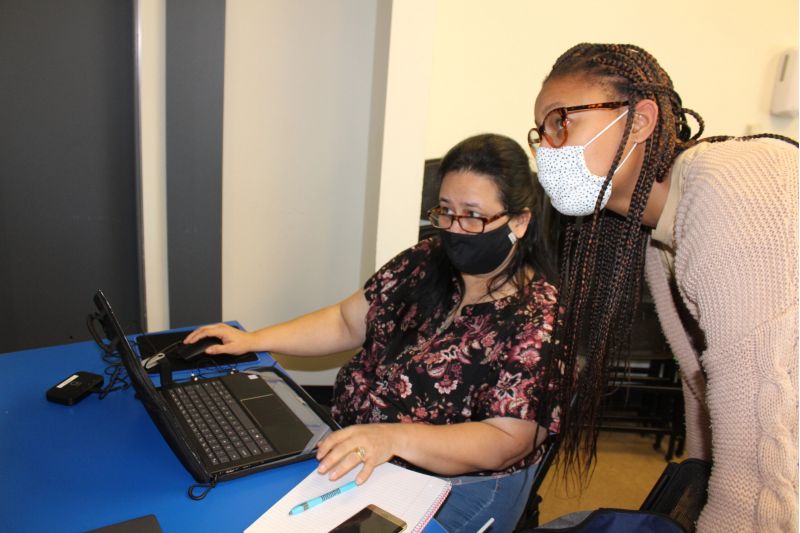Watch Our ‘All Eyes on Austin’ Policy Webinar Series on Demand

At United Way of Metropolitan Dallas, advocacy is an important part of our mission to improve access to education, income and health. We unite advocates from across North Texas to speak up for policies that benefit our region by expanding opportunities and driving change.
Advocacy is particularly important during the biennial Texas legislative sessions—the next of which begins on Jan. 14, 2025. To prepare for the upcoming session, our team partnered with the United Ways of Tarrant and Denton counties to host All Eyes on Austin, an exclusive three-part virtual policy pre-briefing series.
Each webinar featured a panel of experts exploring pressing policy issues facing North Texans in the areas of education, income and health. Their expertise and insights are invaluable for any change-seeker interested in advocating with us.
Read the highlights below and watch the full recordings on demand.
All Eyes on Austin: Education Policy Webinar
The first virtual policy briefing, held Oct. 16, focused on education and specifically addressed grade-level reading and numeracy proficiency, along with college and career readiness, with an emphasis on STEM fields.
This panel featured:
- Jeannie Bailey, Manager for Sustainable Development, Toyota North America
- Kate Hoffman, Policy & State Coalition Manager, The Commit Partnership
- Dr. John Quintanilla, Dean of the College of Science, University of North Texas
- Abigail Williams, Founder & CEO, United to Learn (Moderator)
During the panel, Kate Hoffman highlighted data from the Commit Partnership’s Dallas County Scorecard that showed some promising gains for college and career readiness but also revealed how 47% of all Texas students across the state performed at grade level on the STAAR exam. Unfortunately, only one in five of third graders catch up to grade level by sixth grade.
Dr. Quintanilla focused on the post-pandemic effects on students and mentioned that many students are behind in college-level math coursework. He shared how math placement has a direct correlation to college readiness and success in other coursework.
Lastly, Jeannie Bailey discussed the Dr. Elba and Domingo Garcia West Dallas STEM School initiative that is concentrated on the future workforce and community engagement. She underscored how while there will be nearly 3.5 million STEM jobs available, 2 million will go unfilled due to the gap in STEM education—which is why we as a community must support STEM initiatives.
All Eyes on Austin: Income Policy Webinar
The second virtual event in the series, held Oct. 23, focused on the substantial impact that income plays on childcare access. The discussion featured experts who delivered insights into some of the key topics that are likely to come up this legislative session:
- Nicole Allen, Child Care Quality Unit Director, Workforce Solutions for Tarrant County, who discussed the importance of quality early childhood education and how it transcends to the workforce
- Sadie Funk, National Director, Best Place for Working Parents, who explored the economic challenges that families face when wanting to access high-quality childcare
- Tori Mannes, CEO and President, ChildCareGroup, who shared examples of childhood programs that would successfully support both the child and parent in a rapidly changing world
- Melanie Rubin, Executive Director of the North Texas Early Education Alliance (Moderator)
The core takeaway was that childcare is an economic issue. The panel also discussed solutions in partnering with the business community to offer onsite childcare for their employees.
Employers lose $23 billion annually in productivity costs due to childcare challenges faced by their workforce, and childcare has only become more expensive since the COVID-19 pandemic. A strong workforce and economy in the North Texas region require a robust childcare system. Everybody wins when we really focus on the stabilization of the childcare industry.
All Eyes on Austin: Health Policy Webinar
The final virtual event in the series, held Oct. 30, focused on the underlying conditions of food insecurity on the outcome of health across North Texas. The discussion featured three experts who delivered insights into some of the key topics that are likely to come up this legislative session:
- Tonya Edwards, Director of SNAP and Social Services Assistance, North Texas Food Bank, who discussed the benefits of food assistance programs and other social services such as SNAP
- Tracey Eubanks, CEO, Metrocrest Services, who emphasized the importance of sustainable programs, such as food pantries, to build stronger, healthier communities.
- Dr. Jared Williams, Vice President of Government & External Affairs, Tarrant Area Food Bank, who discussed the role government can play in facilitating food security within vulnerable communities
Moderating this insightful discussion was Ross Sinicropi, food resource manager at Feeding Texas, who opened the panel with a question: “What does food insecurity look like to you?”
Edwards reminisced back to her high school days, remembering her monthly shopping trips with her grandmother, who had to make the hard decision to put groceries back on the shelf after discovering the bill was far beyond budget. Her grandmother was forced to pick and choose what she could do without for the month, which greatly affected the family and household.
These experiences have become far too common in our region and, according to Feeding America, Texas now leads the nation in hunger, with nearly 5 million Texans unsure of where their next meal will come from. Oftentimes, there’s a misconception that food insecurity only impacts the homeless population, but the reality is that one in seven adults within Texas experience food insecurity, and 40% of those impacted are children. The other most susceptible communities of food insecurity are working families, underemployed individuals, youth, college students, seniors, veterans and disabled individuals.
Dr. Williams raised the importance of providing not just food to individuals who are food insecure but ensuring it is both nutritional in value and healthy to consume. He said he grew up in a family of two working parents, but times were still often tough. His “struggle meal” was fried baloney and syrup because there were no other significant food options available in the home. Recognizing the impact on health that food insecurity plays on individuals is monumental.
Eubanks affirmed how there has been an enormous increase and demand for healthy foods since the pandemic as families had to be cognizant of health conditions and the role food may play a positive or negative outcome. There has also been a spike in seniors experiencing food insecurity, and Eubanks noted that “accessibility, innovative ways to deliver food in a manner that works and offering wrap around services conducive to the population in need” are core principles that his organization, Metrocrest, provides to mitigate the impact of food insecurity across North Texas.
Advocate with Us
Together with hundreds of dedicated advocates, we’re speaking up for policies that directly impact education, income and health in North Texas. By advocating for education, income and health, we can ensure the lawmakers who represent us understand how policy directly impacts people’s lives.
As we approach the beginning of the 2025 Texas legislative session, we invite change-seekers like you to join our advocacy efforts. The more people we have speaking up with us, united, the greater the impact of our collective efforts.
Here are two ways to get involved:
- Sign up for advocacy updates: Be sure you’re in the know about our ongoing advocacy efforts by signing up for our Advocacy Alerts and Policy in Brief newsletters. Sign up here.
- Save the date for Advocacy Day at the Capitol: Join the United Way of Metropolitan Dallas delegation in Austin Feb. 25-27 for Texas United Way Capitol Day—a rare opportunity to engage directly in advocacy and democracy with our elected representatives. Click here to learn more and register.
Tags

Advocate for Meaningful Change
We make it easy to speak out about issues that affect our community. Sign up for our Advocacy Alerts, and we’ll let you know when and how to contact your elected officials to make the biggest possible impact.


